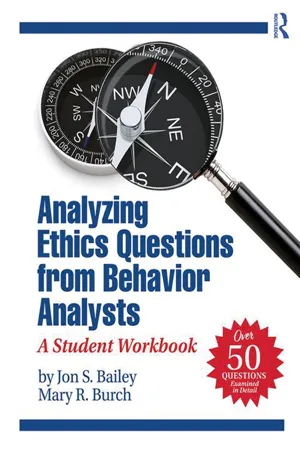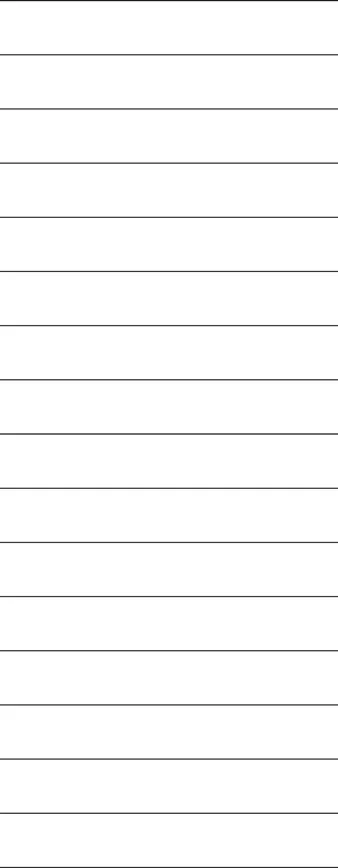![]()
1
Ethics Questions
Ethics Question #1
It was brought to my attention that one of my RBTs has a picture of a former client (i.e. no longer receiving services from us) on her phone. The mother of the client sent the picture to the RBT and frequently gives us updates on the child’s well-being due to the family moving from one state to another. Is this a violation of Code 2.06 (e)?
I’m assuming this is not a problem since the child is no longer a client; however, I know one ethical code item states waiting two years before having contact with a family who was once in a professional relationship with you (Code 1.07 (b, c) Exploitative Relationships). Yet, this Code item states “sexual relationships” which is definitely not occurring.
Ethics Question #2
My question is whether a behavior analyst may do a presentation for an advocacy group or a local parent support group for parents of children with some form of disability.
In most cases, one can assume that presenting to a parent group is a problem because parents are “potential users of services who, because of their particular circumstances, are vulnerable to undue influence.” I just wanted some clarification.
Ethics Question #3
I have a quick ethics question. I know that as BCBAs we do not solicit testimonials but is it acceptable to approach a student from the classroom in which I am already working?
I work with a client in a classroom in a school for children with disabilities. There is a peer that I feel could benefit greatly from my services. In the classroom, I have successfully paired him as a peer for my client and have even helped him acquire the beginnings of functional communication in order to facilitate interactions with my client. I would like to offer my services to his mother but I feel like that might not be allowed.
I cannot reason why but it feels like I shouldn’t be singling him out of a classroom of children.
What do you think?
Ethics Question #4
I have an ethics question. I have been at several IEP meetings where a particular individual is using the title of behavior analyst when introducing herself to parents, district representatives, and whoever else is in attendance. This individual is currently collecting her practicum hours and has not yet sat for the exam. I believe she is at 500 hours.
When questioned as to why this individual is representing herself as a behavior analyst, her district is saying that is okay for her to do so because she is in the process of becoming a behavior analyst and that is the job title for which she was hired.
Is it ethical for this person to be calling herself a behavior analyst?
Ethics Question #5
Dear Behavior Analysis Ethicist,
Thank you for taking the time to read this! I am concerned that I am working for a company that is unethical in its practices, and I am unsure of how to proceed. Some background: I am currently employed as a BCBA by an ABA company that is owned by a pediatric neurologist. Management is pressuring me to implement procedures written by the neurologist that advocate a procedure called “quiet sitting” which requires a child be kept sitting and engaged in absolutely nothing for ten-minute intervals. It does not teach replacement behaviors and the procedure is missing several components of an ethical behavior program.
The clinical director (also a BCBA) is directing me to implement the methods from the book in my ABA programs along with programs that are outside of my scope of practice (OT, speech, academic programs). When I informed management that this is not within my field’s Code of Ethics, I was told that I had a narrow-minded interpretation of my ethical code and it may cause me to lose my job.
I found out that children are being restrained during ABA programs that include “quiet sitting.” I am unsure if it is best for me to move on to another company or if there is more I should do to advocate for these clients as well as ABA as a whole.
Do you have any suggestions to ensure that I meet my ethical obligations?
Ethics Question #6
Good evening,
I am an ABA graduate student coming to the end of my degree. As a part of our course, we complete a functional analysis within our supervision setting.
I am also a foster parent. My six-year-old foster daughter who has autism has begun engaging in some worrying behavior at school and at home. I’d like to conduct a functional analysis on the behavior with the support of some fellow students. However, the state has legal custody of her, and I am paid by the state to care for her.
What are my ethical concerns here?
Are they insurmountable?
Ethics Question #7
I have a concern about a possible ethical violation. I wanted to find out if indeed there has been a violation and what, if anything, I can do about it. I am a BCBA working at an ABA agency. I recently put in my 30-days-notice of resignation, so that I would ideally have enough time to properly transition my cases to another supervisor and say goodbye to my families.
I was called into a last-minute meeting this morning by our executive director, and she handed me my last paycheck and told me that I was to leave the company effective immediately. I was told that I would not be allowed to properly transition my cases to a new supervisor, and I was not allowed to contact any of my families or staff. I had to hand over all documents then and there, and was told to delete all client contact information from my phone. When I asked them why they were doing this, they would not give me a reason. I asked if I had done anything wrong, and they said no.
I told them I felt this was unethical because it seems like client abandonment. I should also note that several BCBAs have put in their resignation recently, and many others are in the process of interviewing elsewhere so there really isn’t anyone available to take my clients right now. I am very much concerned for the well-being of my clients and staff, and I do not agree with or feel good about this decision. I feel like this is client abandonment, that I will be leaving staff with no notice or support.
In this situation, was there an ethical violation and is there anything I can do about it?
Ethics Question #8
I have a 20-year-old client diagnosed with ASD living in a residential setting. I have a behavior plan in place for his SIB, providing replacement behaviors for the SIB, and dealing with his whining. When he doesn’t get his way or if a promised reinforcer is not delivered quickly enough, he will whine persistently and can become aggressive. He is about to undergo various treatments for suspected Lyme Disease, Candida infestation (fungal infection), etc. and the interventions are expected to have an impact on MOs and SDs.
The parents have sought out a naturopath (alternative medicine practitioner) for the treatment of the yeast infection without consulting the behavior team. I am unable to work directly with the naturopath because he doesn’t want to collaborate and the parents are okay with this. I’m trying to find a comfortable way to look at this but so far, I haven’t landed anywhere.
I’m told that the expected impact of being Candida-free is that behavior is likely to change. Specifically, that if there is no more problem behavior it’ll be because of the Candida removal. But if there still is problem behavior, there is probably still Candida. And, of course, they’re expecting discomfort in the Candida “removal process.”
After reviewing the state of the science on these things and asking for the naturopath to add any more info and getting no reply, I am at a bit of a loss. It feels like possible crossroads in treatment planning and implementation on the horizon.
Since this is an adult and the funds are public, there is no real limit as it’s one of the “special circumstances” cases meaning that the money is going to flow and they could probably do dolphin therapy if they wanted and get it paid for.
However, I am wondering where things like substitute decision-maker status of guardian would come into question if the treatments are not evidence-based. And whether I would say that and how.
Thank you for any ideas you may have.
Ethics Question #9
My kindergarten-aged client has an IEP meeting scheduled for tomorrow. We received a draft of the Functional Behavior Assessment (FBA) and Behavior Intervention Plan (BIP) last night. I read in the BIP that the school is using a seclusion room called a “calm-down room,” which the mother told me is a padded closet with a locked door.
I find this to be extremely concerning and unethical.
Do we have any procedures in place for reporting or discouraging the use of this type of punishment procedure in public school settings?
Ethics Question #10
I am a brand new BCBA who did not receive very good supervision when I was in training, but want to become a responsible supervisor. My company is headed by a BCBA who has supported me, but she does not actually work with clients and she is not up to date on the Code of Ethics.
I was reading through Code 5.0 and was puzzled by 5.07 where it says, “Behavior analysts design systems for obtaining ongoing evaluation of their own supervision activities.” I don’t know exactly what this means. I’ve asked the other BCBA who has been here a while and she didn’t know either but she told me not to worry about it.
Can you tell me what this means and what I need to do to be compliant? I don’t want to be in trouble with the BACB on my first job.
Ethics Question #11
Hi!
I have a question regarding graduate programs and written academic policies and rules for authorship. In my country, an ABAI accredited graduate program in behavior analysis gives all of its master’s students these written instructions for their master’s theses: “In the event of publication, academic supervisors shall be acknowledged as co-authors.” There is no mention of any contribution by the academic supervisors, as most notably mandated by APA and BACB ethical guidelines.
I am thinking of addressing the department directly, and I am wondering if ABAI has any official policy beyond what is stated in the BACB ethical compliance code (such as the guidelines for The International Committee of Medical Journal Editors (ICMJE), The Vancouver-Group, etc.)?
By the way, the majority of the supervisors are not Board Certified Behavio...














